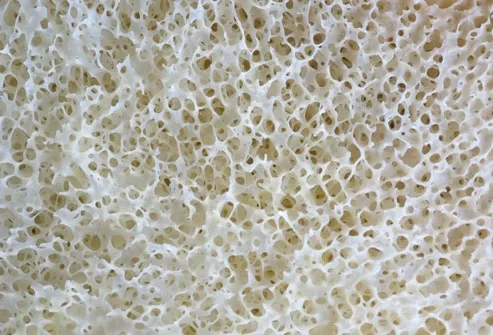Vitamin D is made by your body naturally when your skin is exposed to the sun. Most people can get their daily recommended dose by going outside without sunscreen for about 15 minutes a day during sunny weather. Absorption can be difficult for older people and those with darker skin tones. You can also absorb Vitamin D through the foods that you eat or supplementation.
Foods like Salmon, swordfish, and mackerel have enough Vitamin D for a person in one serving. Other foods that are rich in Vitamin D are tuna and sardines. It can also be found in eggs (yolk), beef liver and in fortified foods like milk and cereals.
 |
| Normal Porous Bone - WebMD |
Multiple Sclerosis is an autoimmune disorder where the body attacks the nerves. This condition is more common in locations that are farther away from the equator where there is less sunlight. A new study links a rare gene defect that causes low levels of Vitamin D and a higher risk of MS. However, this is not enough evidence to recommend this supplement to prevent MS.
Some recent studies have also linked low levels of Vitamin D and Type 2 Diabetes. There may be a link between excess body fat and low levels of Vitamin D. Right now there's not enough proof for anyone to recommend taking Vitamin D to cure the disease or prevent it.
There's a link between low levels of Vitamin D and obesity according to studies. The body fat actually traps the vitamin which makes it less available to be absorbed by the rest of the body. Another study suggested that adding Vitamin D to a calorie-restricted diet may help those with a vitamin deficiency lose weight easier.
There's rumor that Vitamin D deficiency is also linked to depression. Most survey results have been mixed only one showed large doses of Vitamin D could lessen their symptoms. For this one it's best to consult your doctor.
Eating foods rich in Vitamin D as well as getting enough sunlight are the best ways to ensure you are getting enough of what you need. However, if you still need a boost you should look for D2 (ergocalciferol) and D3 (cholecalciferol) supplements.
For adults age 70 and younger 600 IU (international units) is recommended. If you are over 70 you should have a minimum daily intake of 800 IU. While many doctors and researchers do recommend a higher dose be sure that you don't over do it. Vitamin D is fat soluble so it's not easily eliminated by the body like water soluble vitamins. If you take more than 4,000 IU of Vitamin D per day you risk harming your body and causing overdose symptoms like issues with your blood vessels, heart, and kidneys.
Do you think you may be deficient? If you exhibit one or more of the following risk factors you may want to check with your doctor: 50 or older, darker skin, live in the North, overweight/obese/or had gastric bypass surgery, milk allergy/lactose intolerance, diseases/disorders like Crohn's and Celiac where it damages the liver or digestive tract.
Some medicines also deplete the body of Vitamin D. These types of medicines are laxatives, steroids, cholesterol lowering medications, and seizure medications. Some medicines can raise the cause other effects for example digoxin a medicine for the heart can cause the a raise in the calcium in your blood leading to an irregular heart beat.
So how do you find out if your are in fact deficient in Vitamin D? Your doctor or health care provider can give you a test called the 25-hydroxyvitamin D test. This test checks the levels of Vitamin D in the blood. In order to have good bone and overall health it's recommended to have a minimum of 20 nonograms per milliliter (ng/mL). Most doctors recommend 30 ng/mL to make sure you get the full benefit.
Sources:
http://www.webmd.com/food-recipes/ss/slideshow-vitamin-d-overview?ecd=wnl_wmh_102414&ctr=wnl-wmh-102414_nsl-ld-stry&mb=1fvEi6fjCQIExn%40Mx3jvsOHnVev1imbC3AXI5mexUT0%3d
No comments:
Post a Comment